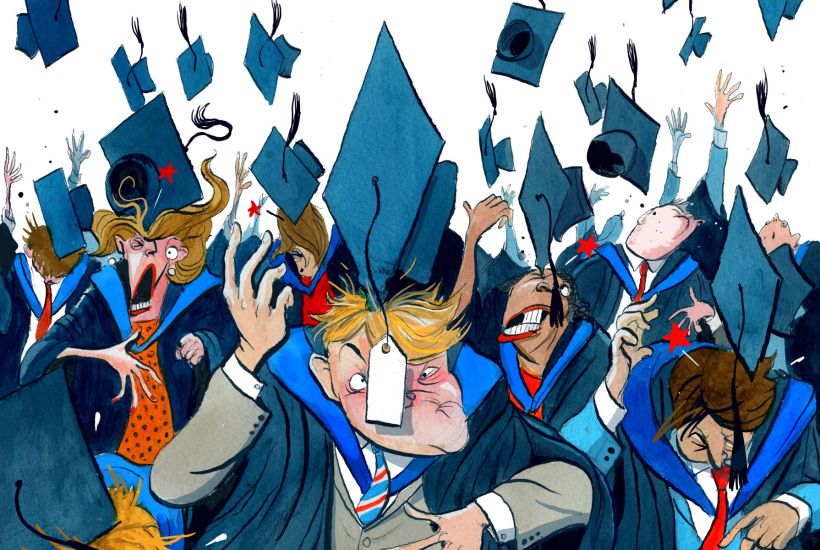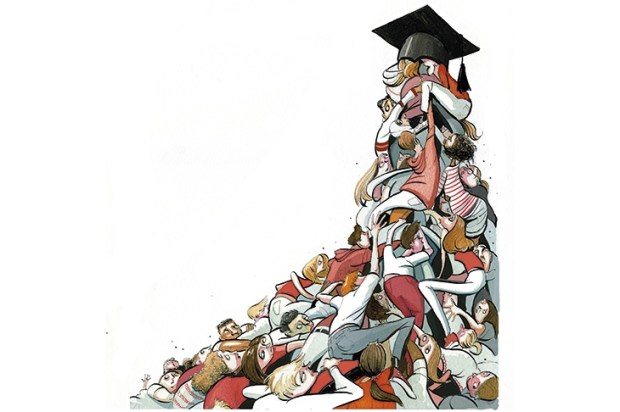Imagine that, just as Britain was closing down for the first Covid lockdown in the spring of 2020, you were 18 years old and had received an offer from the university of your choice, subject to good exam results. The grades proved to be no problem – with all exams cancelled, you were graded in accordance with your teacher’s estimate of how you would perform, and sailed through. But then the time came to go to university and you couldn’t – not properly, anyway.
You kept finding yourself imprisoned in a hall of residence as one student after another tested positive for Covid; you struggled even to get food. Your lectures were all online – and remained so even long after the worst of the pandemic had passed (even now, 28 per cent of courses are being taught with ‘hybrid’ learning). This summer you were due to graduate – except that you can’t because your lecturers are boycotting the marking of exams while they bleat about their pay and conditions. But you have been charged the full whack for your tuition anyway and carry £27,750 in debt for your tuition fees alone.
For half a million young people, there is no need to imagine this scenario – it is their experience of the past three years. And many of them haven’t even had the worst of it yet. If they went to university hoping for a return on their investment by a higher salary, they may be in for a shock.
According to research by the Chartered Institute of Personnel and Development, 36 per cent of graduates are overqualified for the jobs they currently hold. The result of the massive expansion in universities since John Major’s day is some very well qualified bank and post office clerks (3 per cent had a degree in 1992, 30 per cent now), bar staff (the corresponding figures for which are 3 per cent and 19 per cent) and security guards (2 per cent and 24 per cent).
It is A-level results week again, and never has university looked less appealing. Even the Prime Minister has hinted that teenagers might be wasting their time applying. Last month Rishi Sunak told LBC listeners that the government intends to tackle ‘Mickey Mouse degrees’ – unspecified ‘low–value degrees’ which ‘leave people in a job they could have got otherwise and leave them financially worse off’. He was immediately assailed by protests from people who said they had done very well out of their degrees in such subjects as sport and leisure, or video gaming.
Such figures are not, of course, the only way to measure the value of a degree. On no occasion in the 34 years since I graduated from Cambridge with a degree in geography have I ever held a position which required me to provide that, or indeed any other paper qualification. I couldn’t even tell you where my degree certificate is, other than somewhere that is likely to be very dusty. In that sense I am one of those 36 per cent who are overqualified for my current role, but that doesn’t mean that university was a waste of time – even if lectures and supervisions were not always the most enlightening part of it.
Nevertheless, it is deeply unsatisfactory that so many 18-year-olds are being sold a system with too many courses that serve neither students nor society and will rip off thousands of young people.
When Tony Blair set a target to get 50 per cent of school-leavers into university, he failed to explain the rationale. His eldest son has made a career out of demonstrating his father’s folly. Euan Blair (who went to Bristol after failing to secure the A-level results required to take up his Oxford place) went on to found Multiverse, a company promoting apprenticeships, which was valued at £1.4 billion last year.
Euan seems to agree with Sunak, saying: ‘When you look at the 50 per cent target, the belief was that the more people go to university, the more people can access great opportunities, the more we would transition people from full-time education to full-time employment. It has not worked out that way. Lots of students end up in jobs deemed to be low-skilled that would not need a degree in the first place.’
Blair, and Major before him, were wrong to assume that the number of graduate-type jobs would magically expand in line with the number of university places. The decision by David Cameron’s coalition government to lift the tuition fee cap to £9,000 (it was originally set at £1,000 by Blair) was intended to turn students into discerning consumers, thereby dealing with the mismatch between the subjects on offer and the job opportunities available.
But the promised market has been very slow to materialise. The fee increase was so controversial (the Liberal Democrats have never recovered from it) that ministers have not dared raise the tuition fee cap since. So this has created a market system in which UK students are worth steadily less money as inflation erodes their value.
Today’s £9,250 paid by an English student is far less than the £22,000 paid by the average international student, whom universities can charge what they like. No wonder that the number of international students on campus has risen 60 per cent in five years. Paying £9,250 for the very best British university courses is a steal. About a third of students at Bristol, Durham, Edinburgh, Oxford and Cambridge went to private schools, which will have charged much more. For those at the very top, the system works well. For others, not so much.
A study by the University of Bristol, using responses to freedom of information requests to 99 universities, found an extraordinary variation in teaching time by subject and university. Physics students, for example, had three times as many teaching hours as economics students. Astonishingly, one university economics course offered 22 times as many teaching hours as another. The variation between physics courses was even greater. One university offered 26 times as many teaching hours as another (the study didn’t say which). Yet almost all courses charge the same £9,250 a year in tuition fees.
It is puzzling why students, who have such a reputation for protesting against the world in general, have been so slow to make a stand against low-quality degrees. But it is coming. The lawyers behind Student Group Claim, a class action against universities for failing to provide a proper education during Covid (while continuing to collect full fees), say that 100,000 students have signed up. Last month, the High Court put the claim on hold for eight months in the hope that both sides will be able to come to an out-of-court settlement.
Yet for all this, the pull of university remains strong. Some 40 per cent of sixth-formers still apply, whereas the number of apprenticeships has been flat for a decade. For years, higher education – or what passes for it – may have looked like a boom waiting to turn to bust. But the idea of going to university has become so ingrained as a rite of passage for the young, and as a mark of achievement in communities where education would until recently have ended for almost everyone at 16, that it is going to take quite a shift in attitude for many people to feel comfortable about going straight into the workplace. And that is assuming that you can find an employer whose tick-box mentality does not mindlessly sift out job applications from non-graduates. A bust may be coming, but not imminently.
Got something to add? Join the discussion and comment below.
Get 10 issues for just $10
Subscribe to The Spectator Australia today for the next 10 magazine issues, plus full online access, for just $10.
You might disagree with half of it, but you’ll enjoy reading all of it. Try your first month for free, then just $2 a week for the remainder of your first year.














Comments
Don't miss out
Join the conversation with other Spectator Australia readers. Subscribe to leave a comment.
SUBSCRIBEAlready a subscriber? Log in